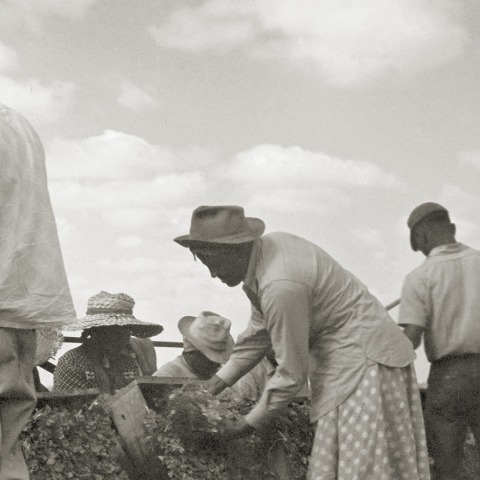“Consuelo Kanaga: Capturing the Spirit” covers the six decades of work of this fundamental figure in the history of modern photography. With this new project, Fundación MAPFRE renews its commitment to publicizing the work of different women photographers, since, although the artist achieved great notoriety during her life, her work is still, surprisingly, little known. This exhibition aims to contribute conclusively to the recognition that Kanaga's work undoubtedly deserves.
Consuelo Kanaga (Astoria, Oregon, 1894-Yorktown Heights, New York, 1978) passionately expressed, in her life and her photography, her concern for social justice. What she was interested in were people and their problems: social marginalization, poverty, racial harassment, or inequality, especially about the African-American population in the United States. These are some of the fundamental concerns that the artist questions through her work. However, she also championed and experimented with the formal and poetic possibilities of photography as an art form.

Untitled, 1930s. Gelatin silver toned copy, 51 × 38.3 × 3.8 cm, framed. Brooklyn Museum, gift of Wallace B. Putnam of the State of Consuelo Kanaga. Photograph by Consuelo Kanaga. Courtesy of the Brooklyn Museum.
An unconventional figure, deeply committed to social justice, Kanaga began practicing photojournalism professionally as early as the 1910s in the United States. She was also one of the few women who maintained a close relationship with American avant-garde circles, both in San Francisco, with the Group f.64, and in New York, with the Photo League. In these contexts, furthermore, her friendship and professional support paved the way for relevant female photographers. However, gender inequalities and social conventions limited her ability to fully dedicate herself to artistic work. She held full-time jobs, practiced her art on weekends, and repeatedly sidelined her career for her male partners; These are some of the reasons why her work is not better known today.
The exhibition, organized from the collection of the Brooklyn Museum, which has safeguarded the artist's archive, has nearly 180 photographs and various archival documentary material. While it covers and contextualizes the work of Consuelo Kanaga and presents some of her iconic images, it also focuses on the role of photography in the representation of the African-American world.
Consuelo Kanaga (Astoria, Oregon, 1894-Yorktown Heights, New York, 1978) passionately expressed, in her life and her photography, her concern for social justice. What she was interested in were people and their problems: social marginalization, poverty, racial harassment, or inequality, especially about the African-American population in the United States. These are some of the fundamental concerns that the artist questions through her work. However, she also championed and experimented with the formal and poetic possibilities of photography as an art form.

Untitled, 1930s. Gelatin silver toned copy, 51 × 38.3 × 3.8 cm, framed. Brooklyn Museum, gift of Wallace B. Putnam of the State of Consuelo Kanaga. Photograph by Consuelo Kanaga. Courtesy of the Brooklyn Museum.
An unconventional figure, deeply committed to social justice, Kanaga began practicing photojournalism professionally as early as the 1910s in the United States. She was also one of the few women who maintained a close relationship with American avant-garde circles, both in San Francisco, with the Group f.64, and in New York, with the Photo League. In these contexts, furthermore, her friendship and professional support paved the way for relevant female photographers. However, gender inequalities and social conventions limited her ability to fully dedicate herself to artistic work. She held full-time jobs, practiced her art on weekends, and repeatedly sidelined her career for her male partners; These are some of the reasons why her work is not better known today.
The exhibition, organized from the collection of the Brooklyn Museum, which has safeguarded the artist's archive, has nearly 180 photographs and various archival documentary material. While it covers and contextualizes the work of Consuelo Kanaga and presents some of her iconic images, it also focuses on the role of photography in the representation of the African-American world.














































